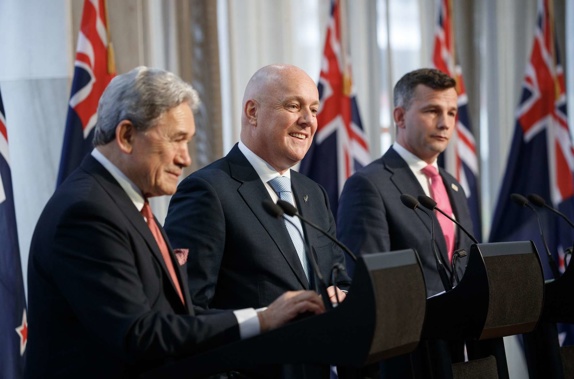
National, Act and NZ First have a problem. Like the American and British armoured columns rolling across the French countryside in 1944, they have been received as liberators.
Metaphorically, there have been flowers and wine and sweet kisses from the lips of grateful maidens. The chests of the victorious Right have swelled with pride – this is what they fought for. This is what they have won.
If only wars were won so simply. But political warfare, just like the real thing, is never simple. With Labour swept from the field, and their irresponsible allies, the Greens and Te Pāti Māori unable to offer any resistance more effective than crude theatrics, the parties of the Right moved swiftly to harmonise their war aims.
Promises had been made: some in public, more in private; to those who had equipped their armies. These, victory’s paymasters, held great expectations. None of the new Coalition Government’s members were of a mind to disappoint them.
The Coalition’s problem lies in the incompatibility of its major donors’ expectations with the hopes of the many thousands of voters who’d abandoned a Left they no longer recognised, for a Right that had promised to defend Democracy. It’s a problem that will develop slowly, only becoming apparent as the impact of the Coalition’s first bold steps to roll back the unmandated reforms of the Sixth Labour Government is absorbed by a judiciary, a public service, universities, and a mainstream media all determined to “resist” the “liberation” of October 14, 2023.
Voters will contrast the swift and unsentimental dispatch of Labour’s fair pay agreements, along with other innovative examples of workplace legislation, with the seeming inability of the Government to bring a halt to “indigenisation" and "decolonisation” – the two key buzzwords of the below-the-radar Māori revolution of 2017-2023.
While the Waitangi Tribunal and the Human Rights Commission remain both unreformed, and unreproved, by the Coalition Government, its reputation as the liberator and defender of New Zealand Democracy will become harder and harder to maintain.

It is difficult to hold yourself up as a defender of human dignity and equality when the coalition government you belong to is busy making the world safe, not for democracy, but for property speculators and landlords. When it is clear that your Transport Minister has never seen a highway he didn’t like, or a railway that he didn’t detest.
Or when your Police Minister seems less interested in keeping the peace than he does in kicking-off a war with the gangs. (Who currently outnumber the police, and seem better equipped than the NZDF!) Or when your Foreign Minister, smeared with Washington’s kisses, seems entirely relaxed about alienating the affections of Beijing.
Just being another crony-capitalist National Party-led coalition government, unwilling to spend serious money on anything other than tax cuts, Roads of National Significance and looking after all those privileged people with large sums of money to donate, is unlikely to keep its poll numbers healthy.
New Zealanders voted for National, Act and NZ First in 2023, not because they were desperate for the return of the easy-osey, jokey-dokey politics of the Key years, but because Labour, the Greens and Te Pāti Māori were beginning to really scare them; and because National, Act and NZ First were the only combination of parties that could guarantee their defeat.
In other words, the evidence of their eyes and ears notwithstanding, the voters were looking for an intelligent, rational, evidence-driven and responsible conservative government whose most important goal was to not just stop Labour in its tracks, but to explain to their fellow New Zealanders – and, hopefully, to Labour itself – exactly why it had to be stopped.
Not only explain, but demonstrate, by means of classically liberal legislative and/or regulatory reform, how democracy is expected to operate.
One of the best places to begin would be with the Waitangi Tribunal. Not by abolishing it, but by making it work in the way it was originally intended to work. For years now, the Tribunal has not been operating like a court. When claimants come before the Tribunal they are not met by the stern, adversarial advocacy of the Crown.
Their claims are not disputed by lawyers determined to protect the honour of the New Zealand state, and to test every piece of evidence presented by the claimants as rigorously as if they were involved in a murder case. Oral history has been permitted to trump the history of written records. Long-nurtured grievances, unsupported by incontrovertible evidence, have, in a surfeit of generosity, been settled.
The Crown has been made to apologise for historical “crimes” that have never been proved beyond reasonable doubt.
All this, and the Tribunal’s dangerous “mission creep”, must be brought to an end. When it began, the Tribunal understood that its power did not extend to passing judgment on land in private ownership, and that compensation was for the Crown to determine as it saw fit. Now we find the Tribunal more-or-less instructing the Crown to make over all its Northland holdings to Ngapuhi.
And, as if that wasn’t enough, to seriously consider reshaping the New Zealand constitution to accommodate the Ngāpuhi interpretation of Te Tiriti o Waitangi.
Is New Zealand’s new Attorney-General, Judith Collins KC, up to facing down the “overmighty subject” that the Tribunal has so clearly become? Is the Minister for Treaty Negotiations, the historian Paul Goldsmith, equal to the task of transforming the Tribunal into a forum where all of this country’s historians are to be made welcome – not just those for whom the Pākehā are the ideologically designated “oppressor” – i.e. the ones to take the blame, and foot the bill?
The task that has fallen to National, Act and NZ First, and the coalition government they have formed, is a daunting one. This election was always about more than appeasing the roading lobby, back-peddling on cimate change and giving the housing market a powerful shot in the arm.
The parties of the Coalition will pay a high price if they refuse to adequately respond to the electorate’s determination that they should, indeed, act as the liberators of the New Zealand people. Democracy cannot defend itself. It can only be defended.
And because the parties that attacked New Zealand democracy came from the Left, the job of restoring it – and making it stronger – is one the Right cannot refuse.
Take your Radio, Podcasts and Music with you









